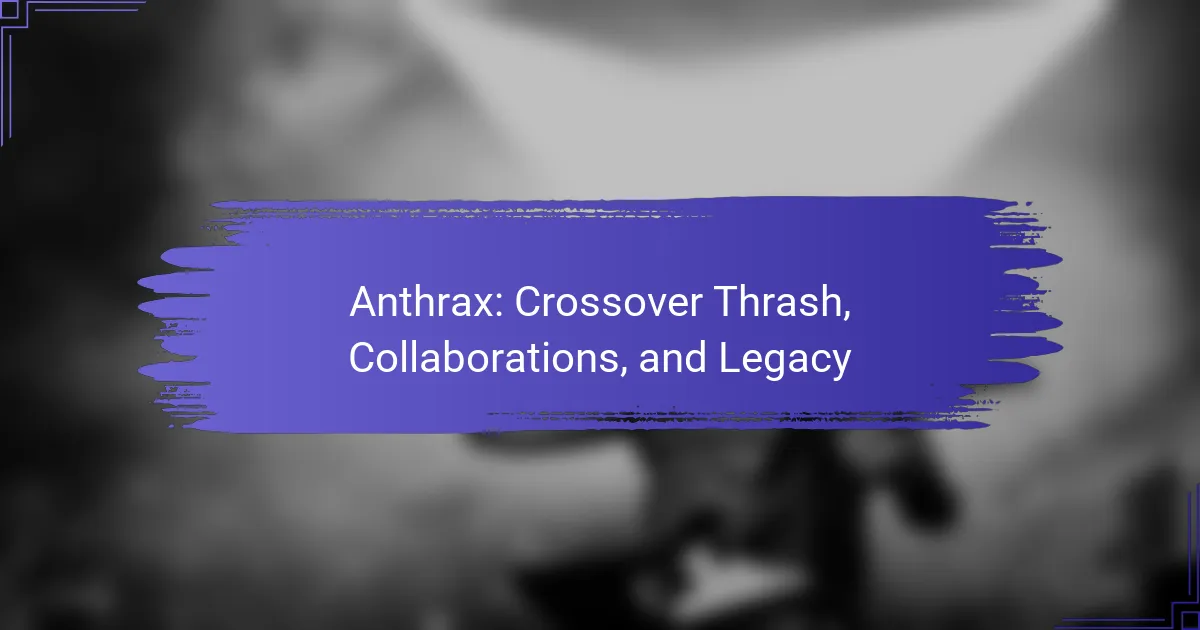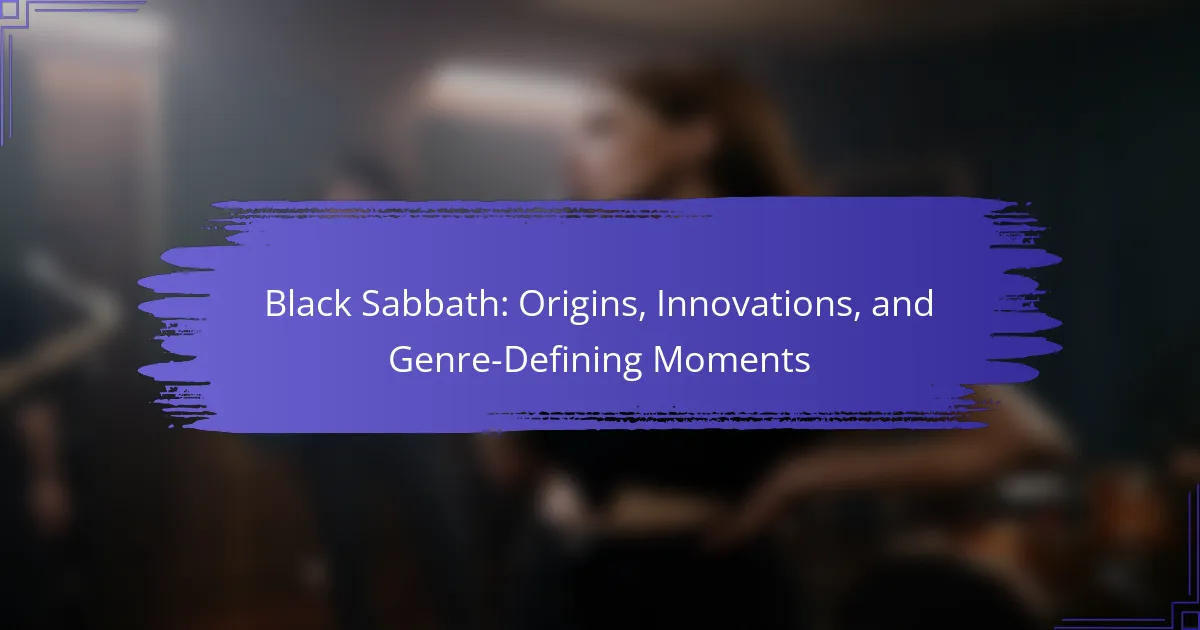Sepultura stands out in the metal genre by blending Brazilian music with heavy metal, creating a unique sound that resonates globally. This article explores their Brazilian roots, key milestones in their musical evolution, and their extensive global reach. It delves into the cultural themes reflected in their lyrics and the band’s influence on the international metal scene. Additionally, it examines regional perceptions of Sepultura and anticipates their future musical direction.
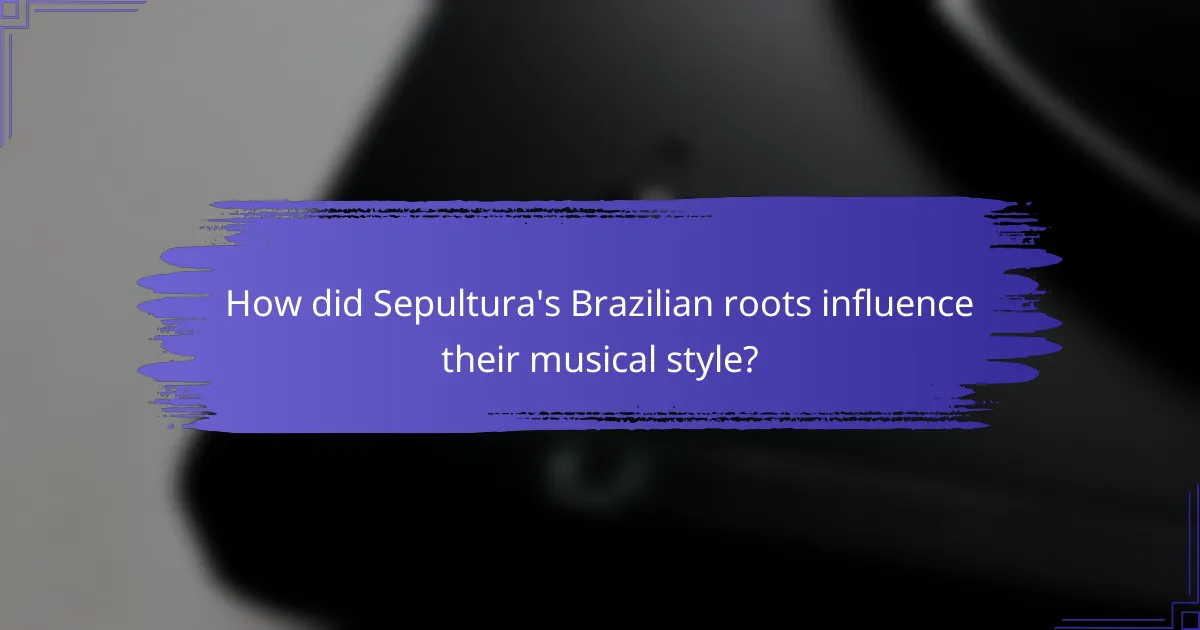
How did Sepultura’s Brazilian roots influence their musical style?
Sepultura’s Brazilian roots significantly shaped their musical style, infusing elements of traditional Brazilian music with heavy metal. This fusion creates a unique sound characterized by rhythmic complexity and cultural depth. The band’s use of indigenous instruments, such as the berimbau, showcases their commitment to blending genres. Additionally, their lyrics often reflect themes of social issues prevalent in Brazil, enhancing their global appeal. This cultural authenticity has contributed to their evolution and success on the world stage, distinguishing them within the metal genre.
What traditional Brazilian elements are present in Sepultura’s music?
Sepultura’s music incorporates traditional Brazilian elements such as indigenous rhythms, samba, and folk melodies. These influences enhance their heavy metal sound, creating a unique fusion. The band often uses percussive instruments like the berimbau, reflecting Brazil’s cultural heritage. Their lyrics frequently draw on Brazilian themes, showcasing the country’s social and political issues.
How does Sepultura incorporate indigenous sounds into their compositions?
Sepultura incorporates indigenous sounds into their compositions by blending traditional Brazilian rhythms and instruments with metal. They often feature elements like the berimbau and indigenous percussion, creating a unique fusion. This approach not only honours their cultural heritage but also enriches their musical diversity. Their album “Roots” exemplifies this integration, showcasing the band’s commitment to Brazilian roots while reaching a global audience.
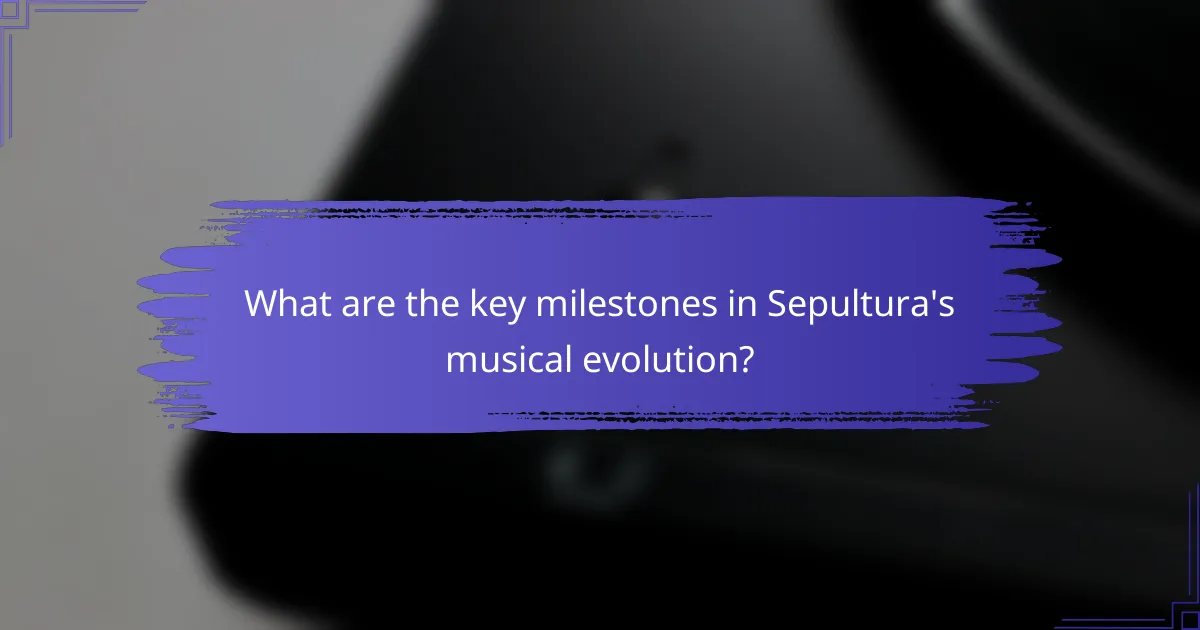
What are the key milestones in Sepultura’s musical evolution?
Sepultura’s key milestones include their formation in 1984, the release of “Beneath the Remains” in 1989, and their incorporation of Brazilian music elements in “Roots” in 1996. These moments marked significant shifts in their sound and global influence. Their transition from thrash metal to a blend of metal and traditional Brazilian music showcases their unique attribute of cultural fusion. The band’s ability to evolve while maintaining their roots has solidified their position in the global metal scene.
Which albums marked significant turning points in their career?
“Roots” and “Chaos A.D.” marked significant turning points in Sepultura’s career. “Roots” (1996) embraced Brazilian culture, incorporating indigenous elements and rhythms. “Chaos A.D.” (1993) showcased their shift towards a more groove-oriented sound, addressing social and political themes. These albums expanded their global reach and solidified their influence in metal music.
How did lineup changes affect their musical direction?
Lineup changes significantly influenced Sepultura’s musical direction by introducing new styles and perspectives. Each member brought unique attributes that shaped the band’s sound. For instance, the departure of Max Cavalera led to a shift towards more experimental elements, integrating diverse genres like tribal rhythms and industrial sounds. This transition allowed for a broader global reach, appealing to various audiences while maintaining their Brazilian roots. The unique contributions of new members, such as Derrick Green, further evolved their lyrical themes and musical complexity, showcasing their adaptability in the ever-changing music landscape.
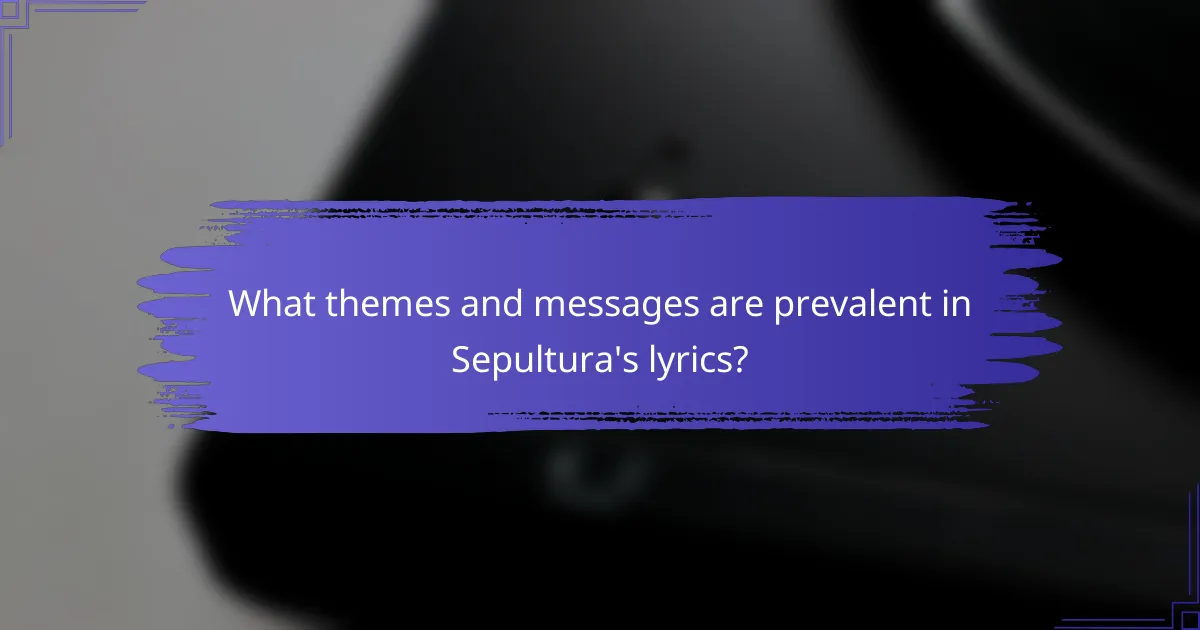
What themes and messages are prevalent in Sepultura’s lyrics?
Sepultura’s lyrics often explore themes of identity, social justice, and cultural heritage. Their music reflects Brazilian roots while addressing global issues. The evolution of their sound incorporates elements of thrash, death metal, and tribal influences, enhancing their messages. The unique attribute of their work lies in the fusion of indigenous Brazilian elements with heavy metal, creating a distinct voice. Rarely, they tackle topics like environmental concerns, showcasing their versatility and awareness.
How do political and social issues shape their songwriting?
Political and social issues significantly influence Sepultura’s songwriting, reflecting Brazil’s turbulent history and cultural diversity. The band’s lyrics often address themes of inequality, violence, and identity, resonating with their audience’s experiences. Their unique attribute lies in blending indigenous sounds with heavy metal, creating a powerful commentary on societal challenges. This approach not only showcases their roots but also amplifies their global reach, making their music a voice for the marginalized.
What role does spirituality play in their music?
Spirituality plays a significant role in Sepultura’s music, influencing their themes and sound. The band incorporates elements of Brazilian indigenous spirituality, reflecting their cultural roots. This connection enhances their lyrical depth, addressing existential themes and social issues. The fusion of metal with traditional Brazilian rhythms and instruments creates a unique auditory experience, bridging spiritual expression and musical evolution.
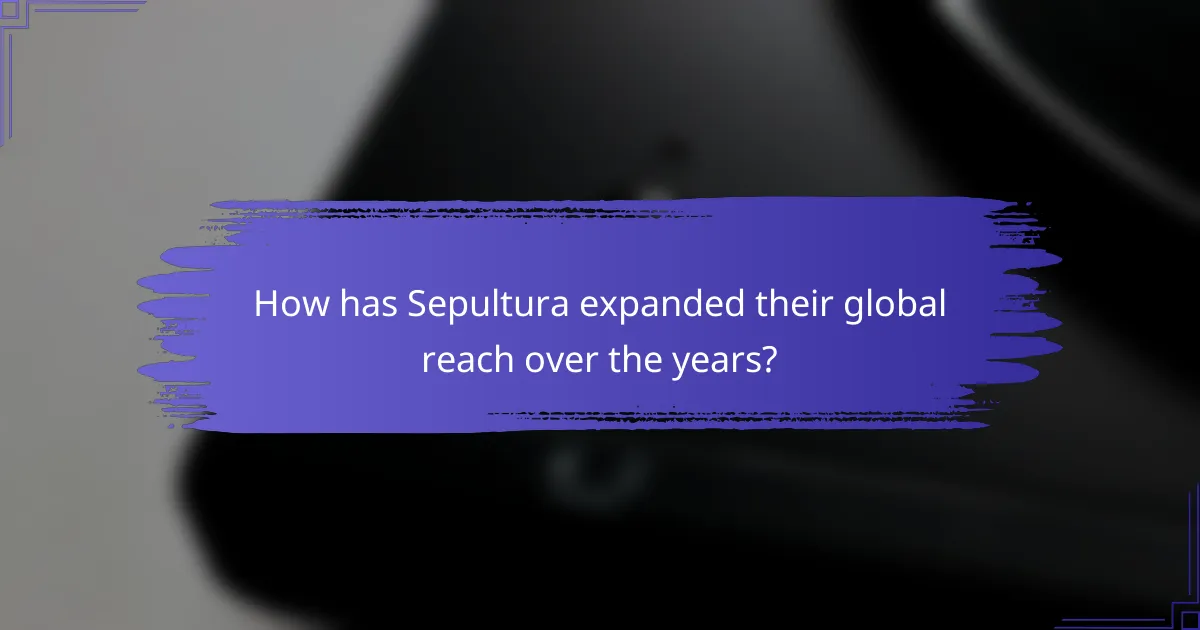
How has Sepultura expanded their global reach over the years?
Sepultura has significantly expanded their global reach through strategic collaborations, extensive touring, and genre evolution. They have collaborated with international artists, enhancing their visibility. Their tours cover diverse continents, attracting varied audiences. The band’s blend of traditional Brazilian music with heavy metal has appealed to a global fan base, making them a unique entity in the metal scene. Their 1996 album “Roots” marked a pivotal moment, showcasing Brazilian culture and music, which contributed to their international acclaim.
Which international collaborations have defined their sound?
Sepultura’s sound has been defined by collaborations with international artists and producers. Notable partnerships include their work with producer Ross Robinson, who helped shape their unique blend of thrash metal and Brazilian music. Collaborations with artists like Andreas Kisser and Derrick Green have also expanded their global reach. Their album “Roots” features collaborations with Brazilian musicians, integrating indigenous sounds that highlight their cultural heritage. These partnerships have allowed Sepultura to innovate and connect with diverse audiences worldwide.
How do they engage with fans across different cultures?
Sepultura engages with fans across different cultures by blending Brazilian musical roots with global influences. They incorporate diverse musical styles, such as metal, samba, and tribal rhythms, which resonate with various audiences. This fusion allows them to connect deeply with fans worldwide, transcending cultural barriers. Their lyrics often reflect social issues relevant to different communities, fostering a sense of unity and shared experience. Through international tours and collaborations, they further enhance their global reach, creating a vibrant exchange with fans from diverse backgrounds.
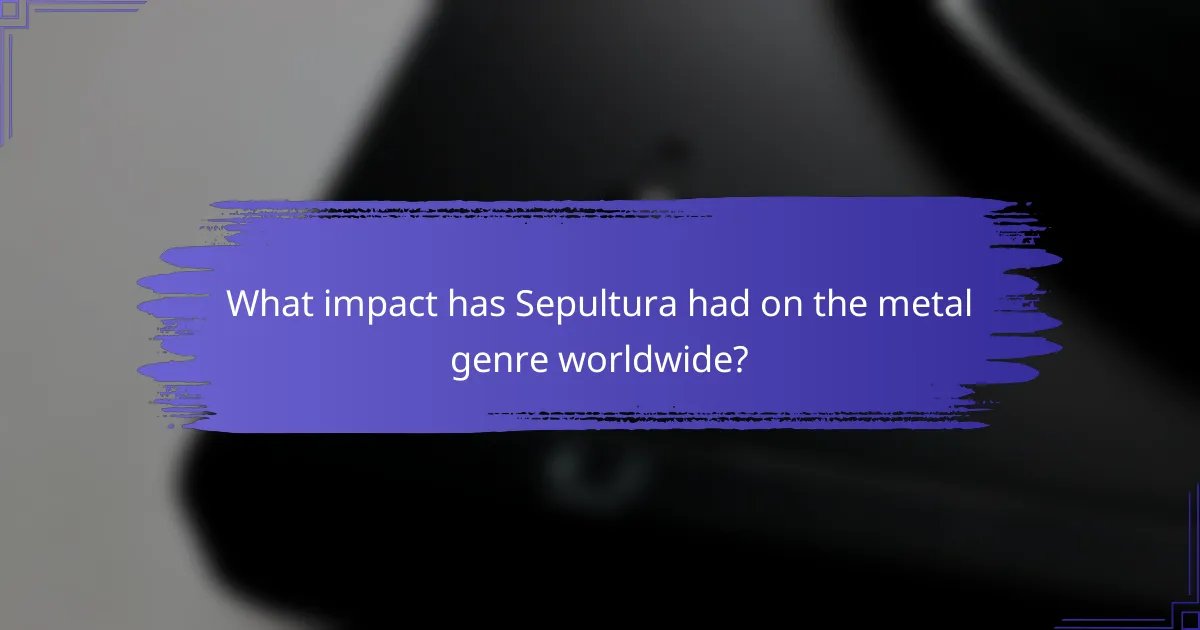
What impact has Sepultura had on the metal genre worldwide?
Sepultura has significantly influenced the metal genre worldwide by blending Brazilian musical elements with heavy metal. Their unique sound, characterized by tribal rhythms and aggressive instrumentation, has inspired countless bands globally. The band’s evolution from thrash metal to incorporating diverse genres showcases their adaptability and innovation. They have expanded metal’s reach, introducing fans to Brazilian culture and rhythms, thus enriching the global metal scene. Their impact is evident in the rise of other Latin American metal bands, which have followed in their footsteps, further diversifying the genre.
How do they influence emerging bands in the metal scene?
Sepultura significantly influences emerging bands in the metal scene through their innovative sound and cultural integration. Their blend of traditional Brazilian music with heavy metal has inspired many new artists to explore diverse musical influences. This unique fusion allows bands to expand their creative boundaries, encouraging a broader acceptance of varied styles within the genre. Additionally, Sepultura’s global reach and success demonstrate that authenticity and cultural heritage can resonate with international audiences, motivating new bands to embrace their roots while pursuing global recognition.
What awards and recognitions have they received globally?
Sepultura has received numerous awards and recognitions globally, including a Grammy Award for Best Metal Performance in 1997 for “Roots Bloody Roots.” They have also been nominated for multiple Latin Grammy Awards, highlighting their influence in the metal genre. The band has been recognized with various awards from music magazines and organizations, showcasing their impact on global music culture. Their unique blend of Brazilian musical elements with heavy metal has earned them a dedicated fan base and critical acclaim worldwide.
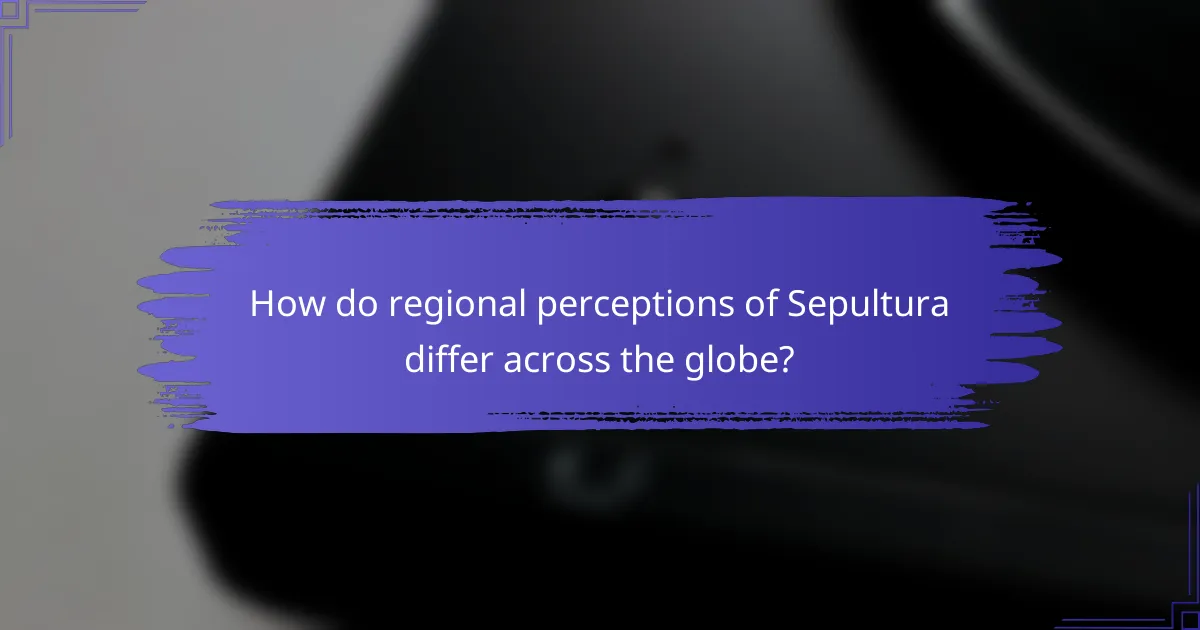
How do regional perceptions of Sepultura differ across the globe?
Regional perceptions of Sepultura vary significantly, influenced by cultural context and musical preferences. In Brazil, Sepultura is celebrated for its pioneering role in heavy metal, embodying national pride and cultural identity. In Europe, especially in countries like Germany, the band is recognized for its technical proficiency and innovation within the genre, often attracting a dedicated following. Conversely, in the United States, perceptions are shaped by the band’s crossover appeal, blending various musical styles, which appeals to a broader audience. In Asia, particularly Japan, Sepultura’s influence is noted for inspiring local metal scenes, showcasing the band’s global reach. Overall, these regional differences highlight Sepultura’s unique attributes and their impact on diverse musical landscapes.
What are the cultural responses to their music in North America?
Cultural responses to Sepultura’s music in North America are diverse and impactful. Their blend of Brazilian roots and heavy metal has resonated with various audiences, leading to a strong following. Fans appreciate their unique sound, which incorporates traditional Brazilian rhythms and instruments, creating a distinct musical identity.
Critics have praised Sepultura for their innovation and willingness to explore different genres, contributing to the global metal scene. The band’s socially conscious lyrics address issues like inequality and environmentalism, further enhancing their cultural relevance.
Their collaborations with artists from various backgrounds have also broadened their appeal, showcasing the fusion of cultures through music. This has led to a greater appreciation for Brazilian music and metal in North America, influencing emerging artists and genres.
Overall, Sepultura’s cultural impact reflects a successful integration of their heritage into a global music context, fostering cross-cultural dialogue and understanding.
How is their music received in Europe compared to Brazil?
Sepultura’s music is generally received more favourably in Europe than in Brazil. European audiences appreciate their fusion of metal with Brazilian rhythms, leading to strong concert attendance and critical acclaim. In contrast, their Brazilian fanbase is smaller, often viewing them as more of a global entity than a local band. European festivals frequently feature Sepultura, highlighting their global reach and influence. In Brazil, while they have a loyal following, the competition from local genres like samba and bossa nova can overshadow their presence.
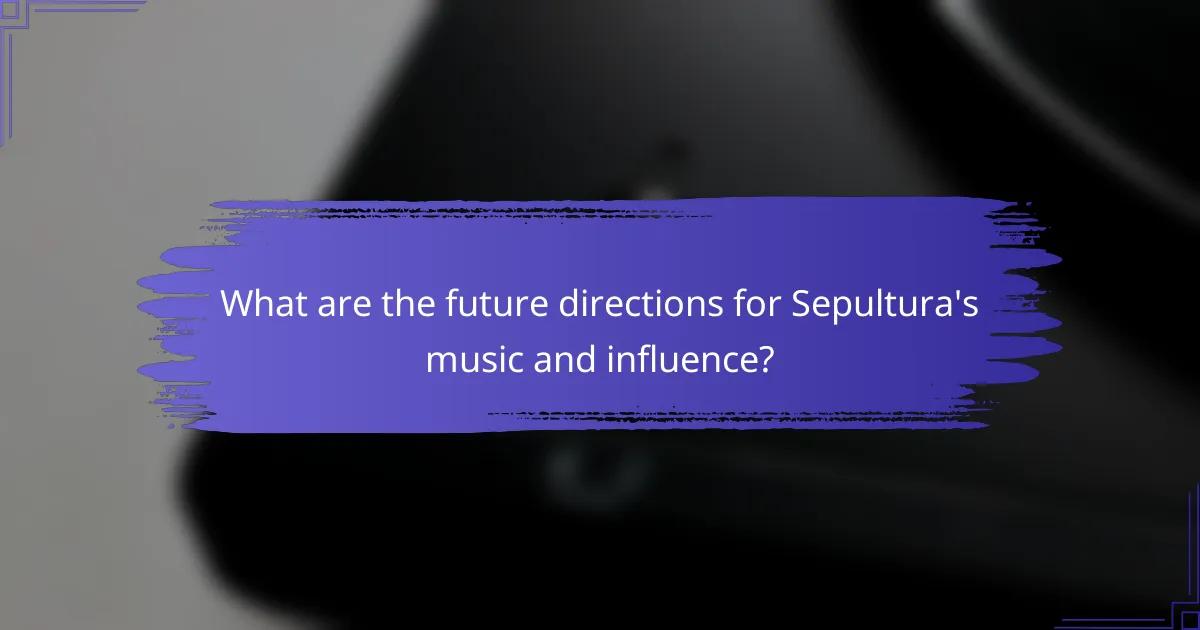
What are the future directions for Sepultura’s music and influence?
Sepultura’s future music will likely blend traditional Brazilian elements with global metal influences. Their commitment to innovation and collaboration can expand their reach. Upcoming projects may explore diverse genres, reflecting their unique heritage and evolving sound. This evolution will further solidify their role as influential figures in the global music scene.
How are they adapting to changes in the music industry?
Sepultura is adapting to changes in the music industry by embracing digital platforms and evolving their sound. They utilize streaming services to reach global audiences, allowing for greater accessibility. The band continues to innovate by blending traditional Brazilian music with heavy metal, enhancing their unique identity. Collaborations with diverse artists further expand their reach and appeal, showcasing their adaptability in a rapidly changing landscape.
What new projects are they currently working on?
Sepultura is currently working on a new album that explores their Brazilian roots while integrating contemporary musical influences. They are also collaborating with various artists to enhance their global reach. The band is focusing on innovative soundscapes and themes that reflect their musical evolution. Additionally, they are planning a tour to promote their upcoming release, aiming to connect with fans worldwide.
What best practices can fans adopt to support Sepultura’s legacy?
Fans can support Sepultura’s legacy by actively promoting their music, attending concerts, and engaging with the community. Sharing their work on social media amplifies their reach. Supporting related causes, such as environmental initiatives, aligns with the band’s values. Additionally, purchasing merchandise helps sustain their career. Collaborating with local music scenes fosters new talent inspired by Sepultura’s influence. Lastly, educating others about their musical evolution and cultural roots ensures their story continues to resonate.

